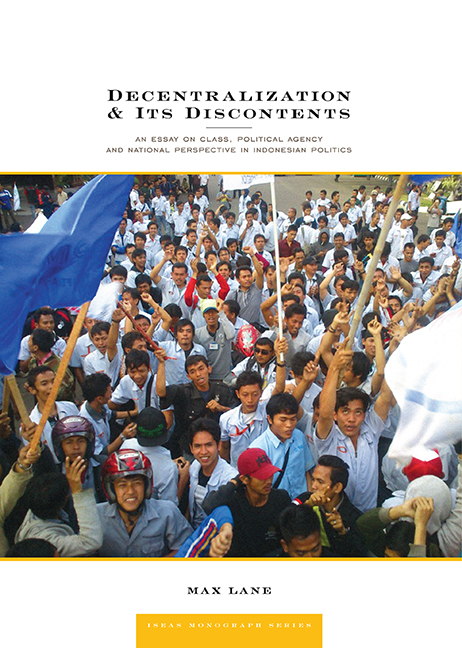 Decentralization and Its Discontents
Decentralization and Its Discontents Book contents
- Frontmatter
- Contents
- Editorial Note
- Preface
- About the Author
- Introduction
- I The Enigmatic Emergence of Decentralization
- II The Political Economy of Desentralisasi
- III Decentralization: Its Discontents
- IV National Agency in a “Co-ordinative State”: The Future of Decentralization
- Conclusion
- Endnotes
- References
II - The Political Economy of Desentralisasi
Published online by Cambridge University Press: 21 October 2015
- Frontmatter
- Contents
- Editorial Note
- Preface
- About the Author
- Introduction
- I The Enigmatic Emergence of Decentralization
- II The Political Economy of Desentralisasi
- III Decentralization: Its Discontents
- IV National Agency in a “Co-ordinative State”: The Future of Decentralization
- Conclusion
- Endnotes
- References
Summary
A primary thesis of this essay is that the sudden emergence of decentralization, seemingly out of nowhere (but actually initiated from within the technocracy) and its strong consolidation over the last ten years is a direct consequence of two interlinked phenomenon. Firstly, the end of crony capitalism. And secondly, in some ways more fundamentally, that Indonesia's general economic underdevelopment has not fostered the growth of a large, strong national capitalist class, i.e., a class with a strong presence throughout the country with a concomitant national perspective, even if one emphasizing its own interests. The inability of Indonesia to industrialize over the last fifty years has meant that most capitalists in Indonesia are small, local capitalists, orienting to limited local markets. The larger capitalists have either evolved as protected cronies, or in very specific market niches, which give limited political clout. And, for a country the size of Indonesia, this group is not only not made up of industrialists, but also small in number.
Conglomerate, Crony vis-à-vis Local Capital
Indonesia has a population of 240 million people, 80 per cent of the United States’ population size. It is likely that by 2050 Indonesia will have overtaken the population size of the United States. It is predicted to reach 450 million. Their gross domestic products (GDP) are, of course, very different from each other. The U.S. GDP for 2012–13 is US$15.7 trillion. Indonesia's GDP is just under US$900 billion. The U.S. per capita income for 2012–13 is close to US$50,000 whereas Indonesia's is US$3,500. It is not surprising that in economies which are so hugely different in scale, their capitalist classes are also very different in scale and nature. This class, to the extent it assumes the role of ruling class, may “rule” over a smaller economy than that of the United States but politically it has to manage a huge and complex country of 250 million people, heading to 450 million, with an island geography and massive issues of underdevelopment.
One way to get a picture of this is to compare the number of billionaires in each economy and also the nature of their enterprises. According to the Forbes listing, the United States has 442 billionaires to Indonesia's 25 billionaires. The majority of the Indonesian billionaires are listed by Forbes as being worth less than US$2 billion.
- Type
- Chapter
- Information
- Decentralization and Its DiscontentsAn Essay on Class, Political Agency and National Perspective in Indonesian Politics, pp. 27 - 50Publisher: ISEAS–Yusof Ishak InstitutePrint publication year: 2014


